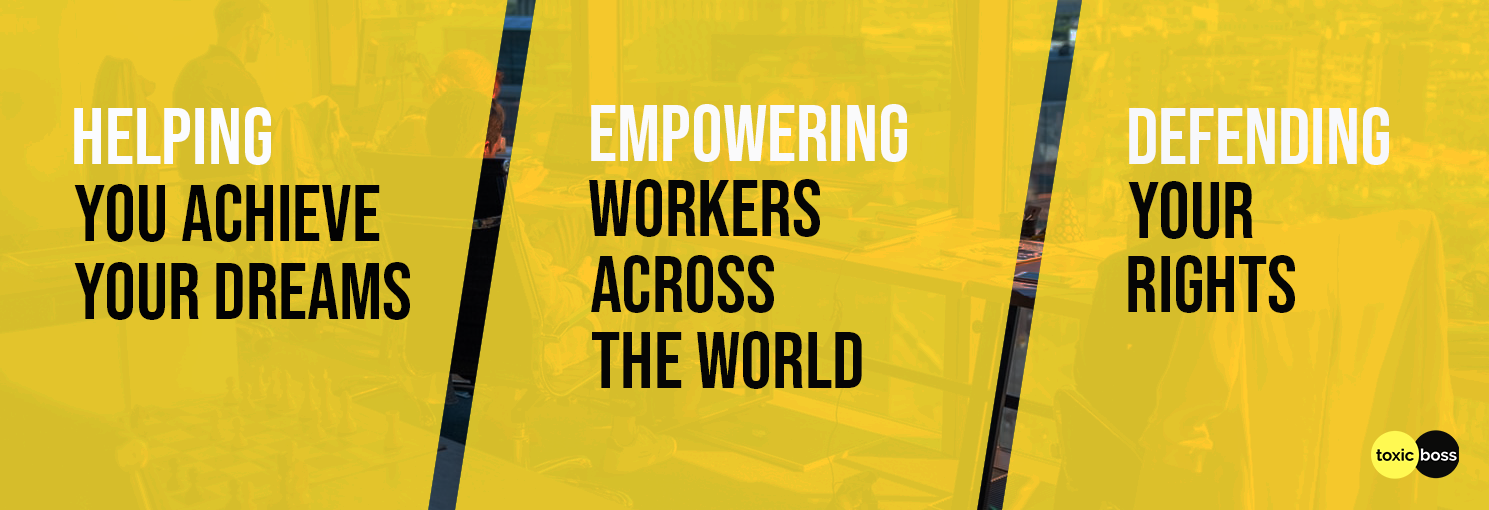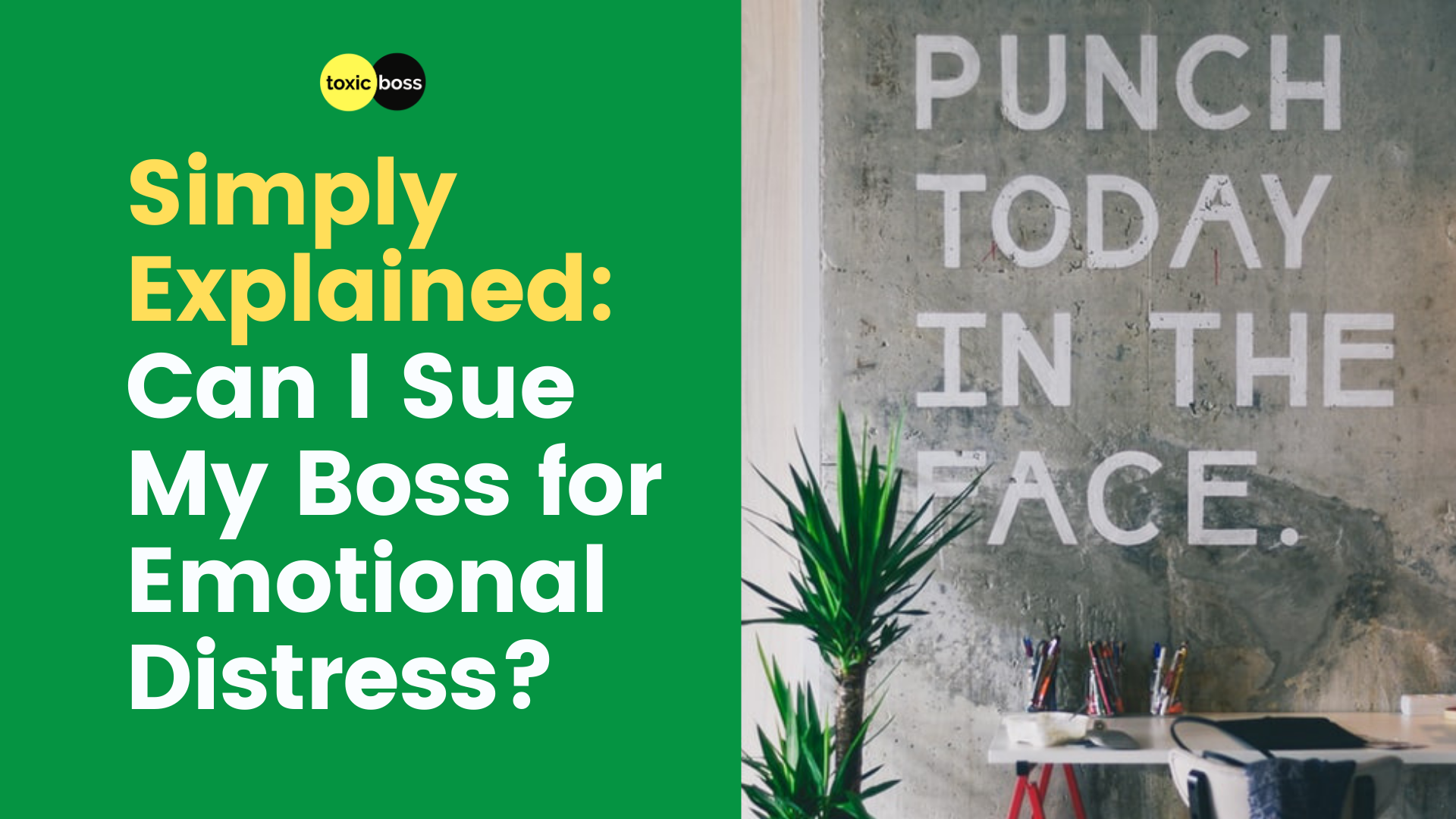February 18, 2020
Law & Regulations
The most general answer is Yes, you can. But, we must stress at the very beginning that these cases are VERY HARD to prove in court. You will certainly need proof and witnesses.
First of all, the law does not oblige employers to treat their employees fairly. This is a huge misconception among employees. They do not have to be nice at all. They may even be jerks, but they must be jerks to everybody in the office, not making distinctions based on “protected” categories, read more about “protected” categories, here.

Lawyers do not recommend suing employers, they say it should almost always be a last resort. It’s easy to prove you have a broken arm: proving you’ve suffered emotionally is more difficult.
So, keep in mind that the law protects employees only in severe cases and you must collect proof for that.
But, let’s start from the beginning.
#1 What does emotional distress mean in law?
Intentional infliction of emotional distress is a common law tort that allows individuals to recover for severe emotional distress caused by another individual who intentionally or recklessly inflicted emotional distress by behaving in an “extreme and outrageous” way.
— called also emotional harm, mental anguish, mental distress, mental disturbance, mental suffering
The following may NOT likely be considered emotional distress conduct:
- Termination of employment in and of itself
- Employer’s or co-worker’s annoying bad habits
- Employer’s or co-worker’s insulting language
- Employer or co-worker disrespecting you
- Employer or co-worker hurting your feeling

#2 Ok, but what exactly counts as emotional distress?
Emotional distress may be feelings and conditions like:
- High blood pressure
- Humiliation/shame
- Disturbance to the nervous systems
- Nausea
- General physical illness
- Depression
- Insomnia
- Self-destructive thoughts
- Anxiety
- Stress

#4 Is emotional distress a crime?
Lawmakers and courts expect all jobs to be stressful. An employer can only be sued when its managers deliberately make a position more stressful than it needs to be in order to harm an employee or to compel the employee to quit.
#3 Since these are feelings, how do you prove emotional distress?
At the beginning, we have stated that it is very hard to prove in court that your employer has caused you emotional distress. But it is not impossible. You must keep in mind that you need as much proof as you may get.
Here are the questions to ask yourself when considering a lawsuit over mental stress or trauma:
- How long ago was your injury?
- Physical manifestation of your stress/trauma?
- Medical diagnosis?
- Causal connection?

#5 These are some of the ways to prove mental anguish and emotional distress at work. The 3 most important are:
1. Doctor’s Note
Professional testimony by a therapist or psychiatrist may be required to validate the existence and depth of the distress and place a dollar value upon it.
While it may be difficult to point out evidence of emotional distress, you may more easily provide evidence of related bodily injuries like ulcers, headaches, and other physical signs of distress.
You can use medical records, insurance claims, pharmacy bills, and therapists’ notes to demonstrate the connection between the action and your emotional distress.
Emotional injuries must be intense. The more intense they are, the better chance you have of proving that your emotional distress was severe enough to deserve compensation.
Tell your doctor about any psychological symptoms you’ve experienced since the accident that caused your injuries. Medically documented emotional distress is a powerful evidentiary tool in both lawsuits and claims with an insurance company.
Note, however, that there is no requirement of an actual bodily injury to accompany a victim’s emotional distress.

2. Duration
Under the statute of limitations, you must file your lawsuit within a certain period of time. For example, a plaintiff in California has two years from the date of injury to file a lawsuit for negligent or intentional infliction of emotional distress.
3. Witnesses
Bystanders to an injury must show physical closeness to the traumatic event, and a relationship to the party injured may be required.
Most plaintiffs’ lawyers will tell you that the co-workers are afraid of retaliation by the company if they don’t side with the company and diss you. So be prepared that your co-workers might not back you up.
4. Documentation
You must be able to show that your employer knew about the issue that was causing emotional distress and either caused the issue or did nothing to resolve it. Internal records of meetings and emails can be important forms of proof in this regard.
You need to prove that:
- The employer had actual knowledge of the specific conduct
- The employer knew the conduct was harmful
- The employer failed to take adequate steps to remedy the situation

#6 Is it worth filing a lawsuit?
In general, it is difficult to put a price on damages for emotional distress. If your claim goes to trial, a jury will determine the amount. Certain factors will influence what you are awarded, such as the level of the outrageousness of your employer’s behavior, the level of emotional distress you suffered, and if the emotional distress is ongoing or the effects are permanent.
If the amount of potential recovery is underwhelming, it may be more difficult to justify the “pain and suffering” that comes with pursuing a lawsuit. Remember, lawsuits require significant time, energy, and expenses, so make sure your injury is worth the suit.
It’s always better to try resolving your dispute through the company’s grievance procedure or open-door policy, or by going to Human Resources.
In case you liked this article, share it with someone who would find it useful too.
[gs-fb-comments]
Related Articles
Quiz: Is my boss really toxic?
Find out if your boss is toxic or not.
Understanding the Narcissistic Boss: Characteristics and Strategies for Coping
A narcissistic boss can be a difficult and challenging person to work with. A narcissistic personality disorder is a mental health condition characterized by an inflated sense of self-importance, a lack of empathy, and a need for admiration. These traits can make a...
How to Tell if Your Boss is a Gaslighter: 12 Signs
Identify the signs of gaslighting behavior in a boss, and read the strategies for dealing with it. Learn how to protect yourself from the negative effects of gaslighting.
When to Leave a Toxic Boss: 3 Real-Life Situations
Do you ask yourself when is the best time to quit a toxic job and leave you toxic boss behind? These people did it, read everything about it.
This actually means if you are miserable at your job, you are on the right track. I know, things in life are not always so obvious.
How a girl in her early twenties got into the corporate world, been under a toxic boss for almost 6 years and came out as a winner.
This is my story. How I survived a toxic boss.
The Latest News & Updates
HOW I SURVIVED A TOXIC BOSS
How a girl in her early twenties got into the corporate world, been under a toxic boss for almost 6 years and came out as a winner.
Join Our Newsletter
Soon we are releasing an ultimate ESCAPE PLAN from your toxic job. Sign up early!
Follow Us
If you want to see all of our posts you should definitely follow us on these platforms.





